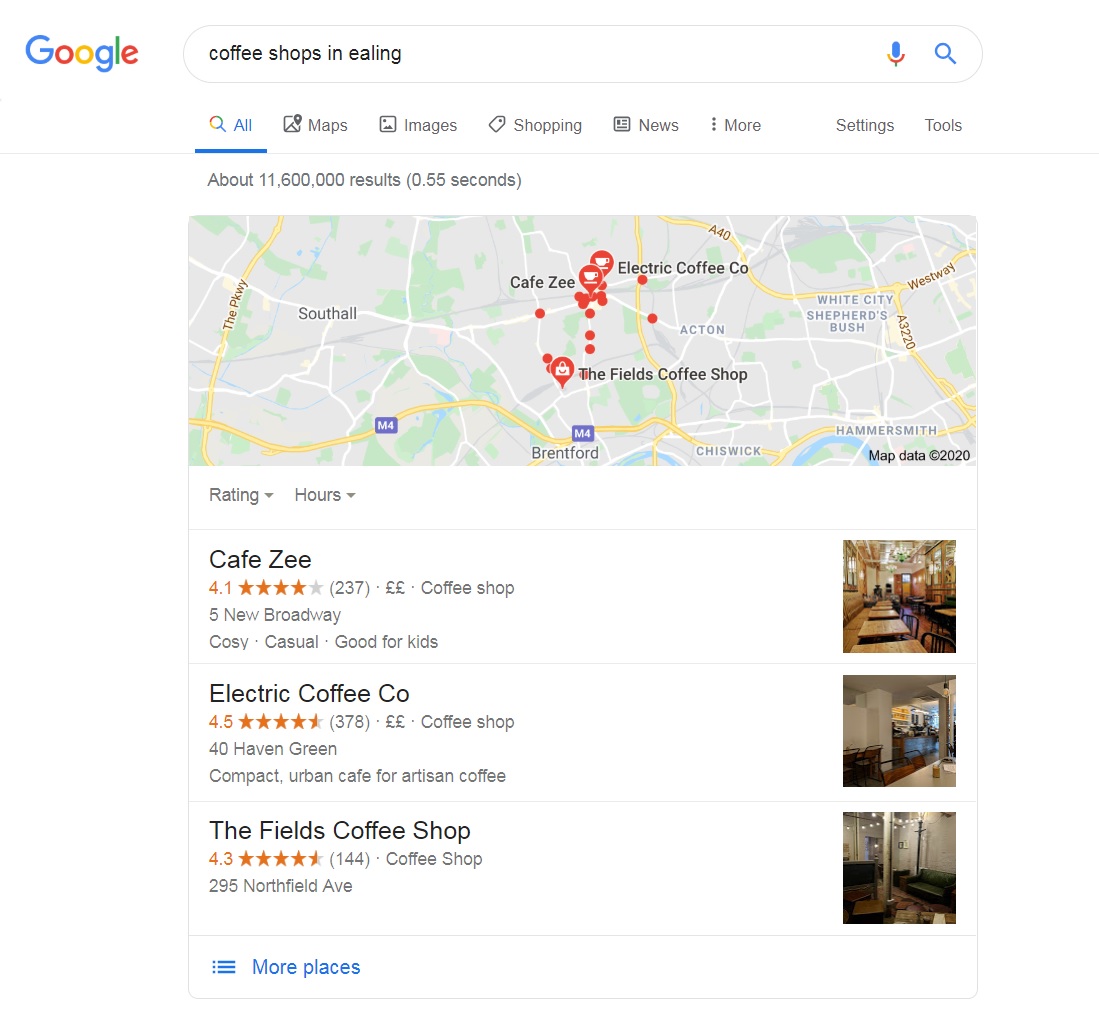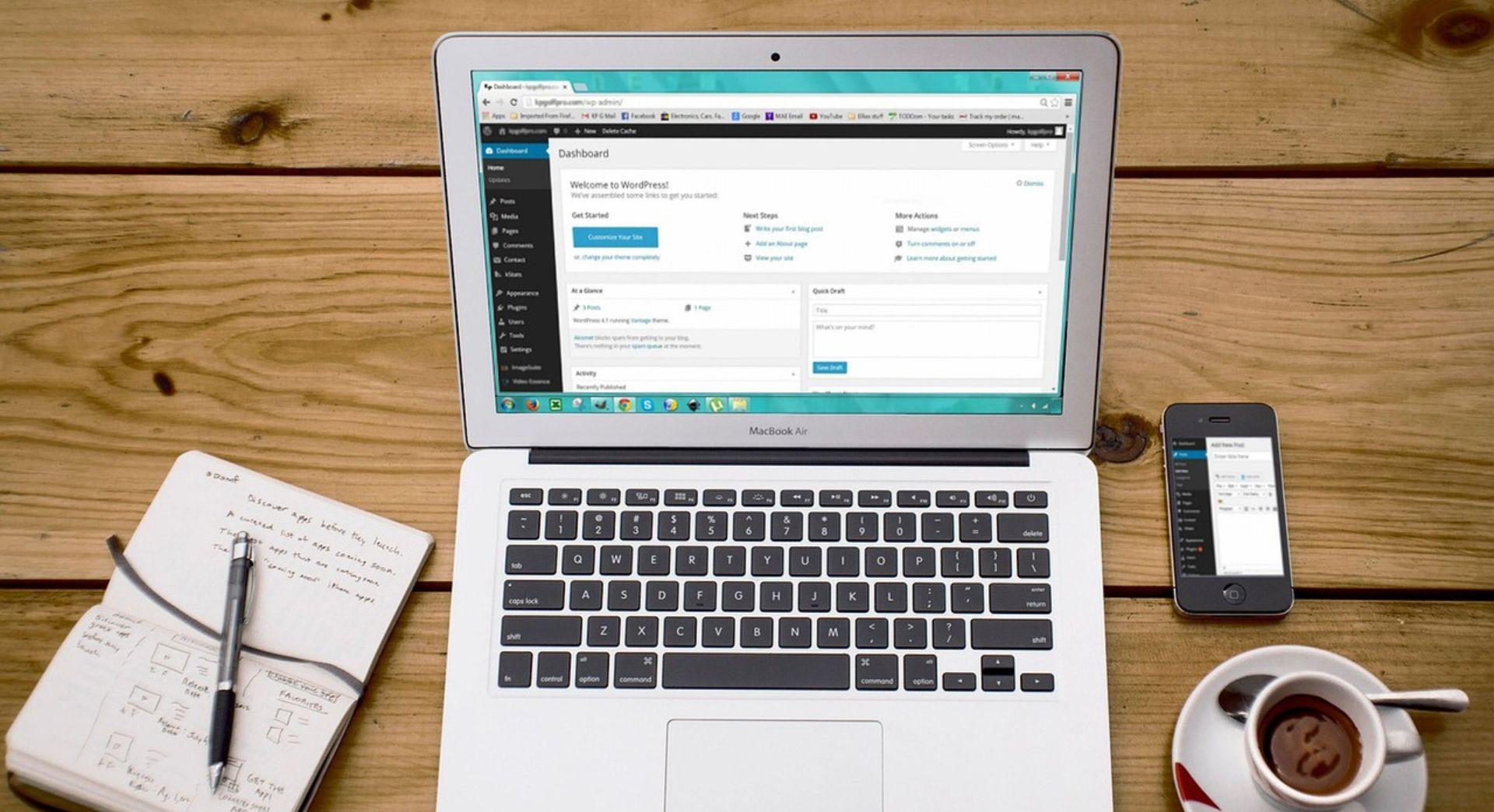Looking for tips to help you advertise a small local business? You're in the right place.
We'll take a look at some low-cost advertising techniques you can use to attract more customers, and the preparation you should undertake before you start advertising.
Before you advertise your small local business
It can be tempting to jump straight into an advertising campaign, but if you do that you'll struggle to measure if your advertising is working or not.
Spend some time thinking about what you want to achieve with your advertising, and how you'll measure what counts as success (or failure) for a campaign.
You can learn about setting marketing and advertising goals in this guide.
Get on Google Maps
If your business has a physical premise, or serves a defined local area then Google Maps can be an important source of customers.
Why? Because it gives you a chance to show up on Google for search terms like "coffee shops in Ealing" or "coffee shops near me".
Here's an example of what these kinds of search results look like:

To get on Google Maps, you need to set up a Google My Business profile. If you're already using GoDaddy Websites + Marketing, then you'll be able to set up Google My Business with just a few clicks.
If you're not using GoDaddy Websites + Marketing, you'll need to create your Google My Business page manually.
You can read more about why Google My Business is important here.
You should also add your business to Bing Places for Business, as that will mean your business can appear on Bing Maps.
Add your business to relevant directories
Adding your business details to relevant, quality business directories is a good idea for two reasons.
The first is that people still search business directories so you could pick up some customers directly.
The second is that adding your details to local directories can help you appear higher in Google's search results, especially when it comes to local searches.
You can find a list of UK business directories here.
But don't add your business details to any directory, make sure the directories you use are suitable for your kind of business (either because they're big general directories that are used by lots of people, or because they're focused on your niche).
You also need to make sure the directory is active and well-maintained. Signs that you should avoid a directory include it having relatively few submissions and listings not being in the right category.
Finally, when you're submitting your business's details to directories, it's vital you ensure the name, address and phone number (NAP) is exactly the same wherever it appears on the internet.
This is because search engines use NAP to work out which businesses to display in local search results. Discrepancies in NAP reduce your chances of ranking highly.
Discrepancies in NAP can include something as simple as not including your area code in your phone number on your website, but including it when you submit to directories.
So make sure your NAP is identical anywhere it appears, including on your website.
Invest in Facebook ads
Facebook advertising is especially great for small local businesses for a couple of reasons.
The first is that it's relatively low cost - £10 a day can be enough to fund an effective campaign. Compare that to Google AdWords where just one click on a competitive term can cost over £10.
The second is that you can target your Facebook ads locally, meaning you aren't going to spend money on people who are never going to use your business because they don't live locally.
Add in the fact that you can target people based on what their interested in, and Facebook becomes even more appealing for small local businesses.
If you don't already have one, you'll need to set up a Facebook page.
Once you've done that, you can read this guide to help you get started with Facebook advertising by using this guide.
Encourage reviews
Good reviews can help someone who is considering using your business make their decision.
Most of the major business directories and Facebook feature a reviews section, so make sure you're keeping tabs on what people are saying.
You can respond to positive reviews by thanking the person who wrote it, for negative reviews you can explain what you're doing to remedy the problem.
You should also encourage customers to leave a review - although don't incentivise them as this is against the rules for many review sites.
You can learn how to get reviews and testimonials in this guide.
Join forces with other local businesses
Formal and informal local business groups are a great way to get word of mouth referrals for your business.
By networking with other business owners, you'll be able to learn if someone has an existing customer who is looking for a service that you provide.
You can network by joining established, formal organisations such as the British Chambers of Commerce, or by seeking out informal groups of businesses in your local area.
Because these informal groups exist to pass referrals on to each other, you'll often find membership is limited to one of each kind of business so as to avoid competition.
But if you find your local group is currently not taking on new members, or there isn't one at all, there's nothing to stop you starting your own.
Don't forget about the local press
It used to be that local newspapers and telephone directories were the top places to advertise a local business.
Now though, the internet has killed off telephone directories completely, and it has done severe damage to local press across the UK.
But that doesn't mean you should write off the local press entirely - after all, they're trying to reach the same people you are.
If you're working on a very tight budget, you may find that taking out all but the smallest ad in your local paper falls outside of your budget.
But don't forget that local papers are always on the lookout for news stories, so if your business can do something newsworthy you can get in the paper without having to pay for an ad.
You can learn more about PR for small businesses in this guide.
Email marketing
Email marketing is a great and affordable technique that can be used by businesses of all sizes.
You can also use it to complement your advertising campaigns - it may be that someone who sees one of your adverts isn't yet ready to become a customer, but if they can sign up to an email newsletter (or something similar) then you'll be able to stay in touch with them.
You'll need a tool like GoDaddy email marketing to run marketing campaigns, and you can learn how to get started with email marketing in this guide.
Summing up
There are plenty of low cost advertising techniques that small local businesses can use, so it's important to take some time to identify what you want to achieve through advertising - only then will you be able to tell if your advertising campaigns are working.






